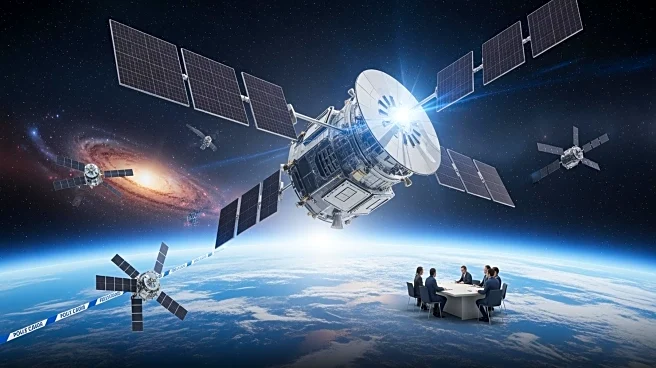What's Happening?
SpaceX has successfully launched its 10,000th Starlink satellite, marking a significant milestone in its mission to provide global internet coverage. The launch took place from Florida's Cape Canaveral
Space Force Station, with a Falcon 9 rocket carrying 28 Starlink satellites. This event also set a record for the Falcon 9's first stage, designated 1067, as it completed its 31st liftoff. SpaceX began its Starlink project in earnest in 2018, and since then, the company has rapidly expanded its satellite constellation. As of now, 8,610 of the 9,988 Starlink satellites launched are operational, with the rest having been deorbited. The company aims to eventually deploy over 30,000 satellites.
Why It's Important?
The successful deployment of the 10,000th Starlink satellite underscores SpaceX's commitment to revolutionizing global internet access. This milestone is crucial as it enhances the capacity and reliability of the Starlink network, which already serves millions of customers worldwide. The expansion of this satellite constellation is expected to improve internet connectivity in remote and underserved areas, potentially transforming digital access and economic opportunities in these regions. Moreover, SpaceX's strategy of reusing rockets, as demonstrated by the Falcon 9's 31st launch, is pivotal in reducing the cost of spaceflight, making satellite deployment more sustainable and economically viable.
What's Next?
SpaceX plans to continue its aggressive satellite deployment strategy, with permission to launch up to 12,000 Starlink satellites and potential expansion to over 30,000. The company is also developing a fully reusable rocket, Starship, which aims to further reduce spaceflight costs and support ambitious projects like Mars colonization. As SpaceX continues to expand its Starlink network, it may face regulatory challenges and competition from other satellite internet providers. The company's ability to maintain and enhance its service quality will be critical in securing its position in the global internet market.
Beyond the Headlines
The expansion of the Starlink network raises important considerations regarding space traffic management and the long-term sustainability of low Earth orbit. With thousands of satellites in orbit, the risk of collisions and space debris increases, necessitating robust regulatory frameworks and international cooperation. Additionally, the proliferation of satellite internet services could have cultural and societal impacts, as increased connectivity may influence global communication patterns and access to information.










